'A threat multiplier': Lives collide on hot Rochester summer streets, often tragically
Things are happening on the streets of Rochester. When it's hot — and chances are each summer will be slightly hotter — things pop off.
What role does the heat play in what teenagers, parents, police, educators and seniors face in the city of Rochester when the pavement is rippling with warmth and it is muggy and the weather is bothersome?
Reporter Rob Bell took to the streets this summer to find out. He discovered patterns that play out all across urban areas and some suburbs in the Northeast. His 5+ weeks of investigation came as part of work by the USA TODAY Network's Perilous Course climate team.
It resulted in the "City on Fire" audio story project. Read much of the transcript of Episode 1 below and check out the special enterprise series on your podcast platform of choice. Note: This series contains language that some may find offensive. Listener and reader discretion is advised.
The Democrat and Chronicle will feature all episodes and many other related project stories during the first half of September. Look for a story about Episode 2 on Monday, Sept. 11.
Rob Bell, USA TODAY Network reporter:
July 13, 1977. Air conditioners throughout New York City were on full blast, stressing the city's power grid as a historic heat wave with 100-degree temperatures stifles residents. Three lightning bolts strike power lines, overwhelming the grid and causing it to shut down. All five city boroughs went dark by 9:40 p.m.
During the 25-hour blackout, there were an estimated a thousand fires, 1,600 damaged stores and more than 3,700 people arrested. Consolidated Edison, the power provider for New York City, called the chain reaction of events that led to the blackout an act of God — or as Moses Robinson likes to phrase it: a chance encounter.
Robinson is a 39-year veteran of the Rochester New York Police Department, a poverty-stricken city 300 miles north of the Big Apple. He's familiar with the heat's impact on crime. It's why he hates summer.
Moses Robinson, Rochester Police Department:
I hate summer.
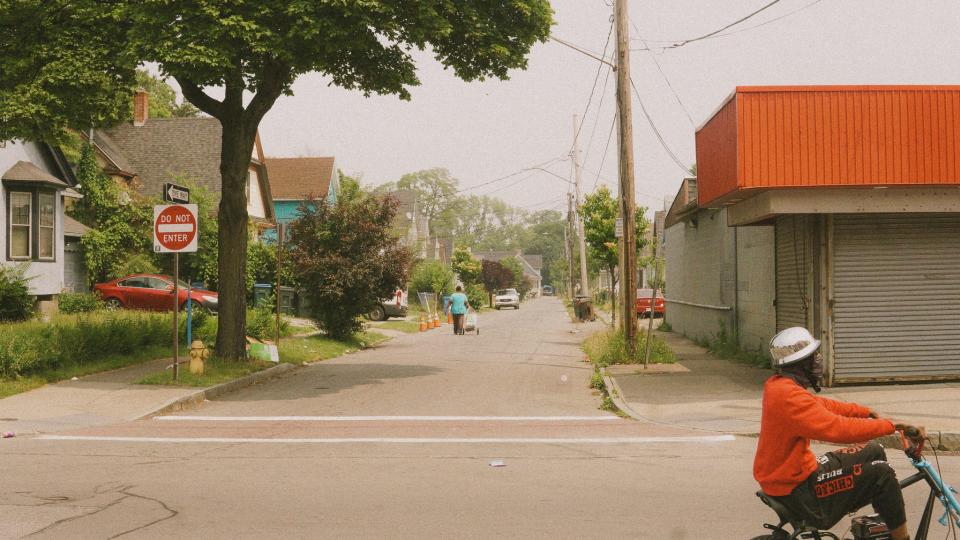
Rob Bell, USA TODAY Network reporter:
In his current role with the Rochester Police, Robinson serves as a liaison between the department and the community.
Moses Robinson, Rochester Police Department:
Because you got to look at when it gets warm out, people come out — and when people come out, it's a beautiful thing because you get a chance to really just like spring. You've been locked up all winter. You want to get out, you want to wear the sneakers, you want to do the summer thing. It's like "Summertime," the song with Will Smith.

Rob Bell, USA TODAY Network reporter:
Cameron Mixon and Brian Boose are 19-year-old cousins living in Rochester's 19th Ward. The two teenagers know the pulse of the city when the summer hits. Here's Cam Mixson.
Cam Mixson, teenager:
A real, real hot day. So how it used to be back when it was like 110 outside, 115, the air not working, the AC not really, really helping for real.
Rob Bell, USA TODAY Network reporter:
Here's Brian Boose,
Brian Boose, teenager:
Everybody coming outside today. We're going to be at this park; we're going to be at this rec center, a hundred people in one place just like that.
Moses Robinson, Rochester Police Department:
A lot of violence unfortunately has to do with chance encounters as well.
Brian Boose, teenager:
All the grown people want to be outside and act up. What do you think they're about to go do with summer? The kids in the home, they outside, too. It's time to go to the bar.
Moses Robinson, Rochester Police Department:
Meeting up at a party, meeting up at some kind of social gathering...
Brian Boose, teenager:
What happened at bars? Same thing that happened at rec centers. Ain't no difference. It's just a big a-- place for everybody to get together.
Moses Robinson, Rochester Police Department:
And so people have had disputes that haven't handled the disputes.
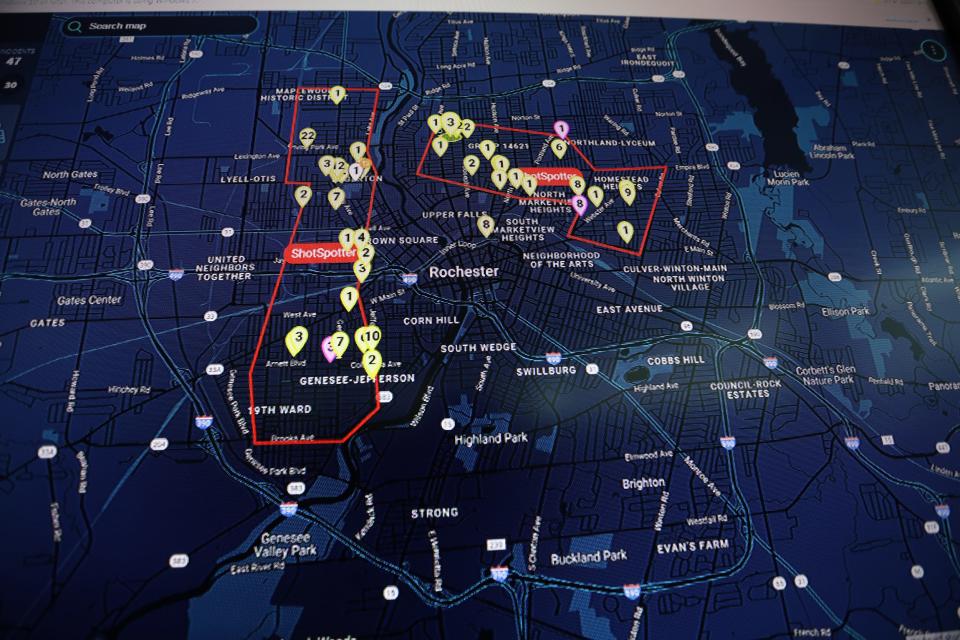
Brian Boose, teenager:
You never know who not rocking with who right now. "You're the person that shot my cousin?"
Moses Robinson, Rochester Police Department:
Retaliation for certain things have happened. They meet up, too.
Brian Boose, teenager:
Even if you don't got nothing to do with it, I guarantee you it's somebody you know or have a close relation with that does.
Moses Robinson, Rochester Police Department:
And this is the other part of the dark side of the chance encounters. Now it's like, "Yo, I ain't seen that guy since last winter or last summer. The dispute wasn't settled."
Brian Boose, teenager:
Everybody got enemies, and everybody's here.
Moses Robinson, Rochester Police Department:
So now the encounter becomes an opportunity for revenge.
Brian Boose, teenager:
Two motherf---ers arguing. Now's a whole shootout.
Moses Robinson, Rochester Police Department:
And so now the summer has this dark side to it in a way.
Rob Bell, USA TODAY Network reporter:
This is "City on Fire," the USA TODAY Network podcast on the effect rising temperatures have on public safety. I'm Rob Bell, a reporter for the Rochester Democrat and Chronicle. This is Episode 1, "Chance Encounters." It's not just summertime that produces the chance encounters. Violence Intervention Specialist Anthony Hall discovered that on an unseasonable hot October day in Rochester.
Anthony Hall, violence intervention specialist:
A fight broke out. I went to break up the fight and somebody shot, was shooting, and I pushed my sister and I ended up getting shot. If I didn't push my sister, my sister probably be dead. How the bullets came. So the bullets was coming down. I mean it hit me in my leg. Some time in the hospital. A piece of metal rod in my leg.
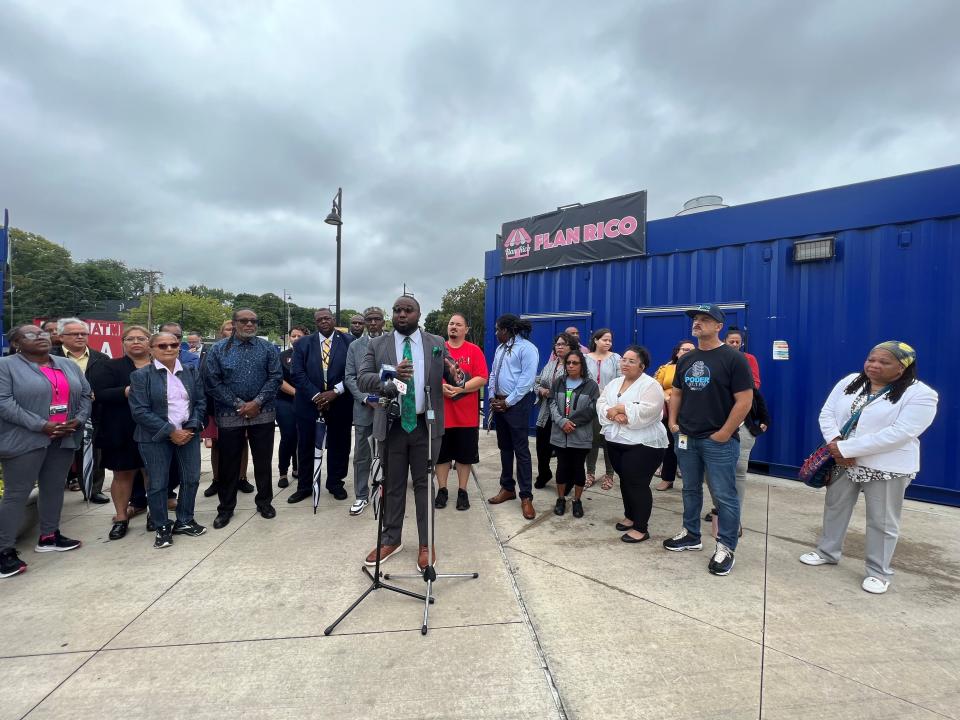
Rob Bell, USA TODAY Network reporter:
Did you know the people fighting?
Anthony Hall, violence intervention specialist:
Yes, I knew both sides.
Rob Bell, USA TODAY Network reporter:
Both sides.
Anthony Hall, violence intervention specialist:
Yeah.
Rob Bell, USA TODAY Network reporter:
So that's why you wasn't stopping.
Anthony Hall, violence intervention specialist:
Yeah.
Rob Bell, USA TODAY Network reporter:
Statistics from the Rochester Police Open Data Portal showed that the number of shootings in the city goes up during the warmer months, year after year. While political, social, economic and demographic factors play a significant role in gun violence.
A United Nations report says scientists see climate change as a threat multiplier.
Like the 1977 New York City blackout, heat will make bad situations explosive. In the 2019 National Bureau of Economic Research experiment, 2,000 participants were randomly assigned to different temperatures in a laboratory. Results found at the hotter the temperature, the more the participant had a thirst for violence. For Brian Boose, hot temperatures used to be the trip to the recreation center.
Brian Boose, teenager:
Boys and Girls Club would be popping right now. It'd be mad people at the Boys and Girls Club every day. And then on top of that, rec centers, you go to Flint, everybody who, everybody outside you go to any rec center or any of that during the summer it was lit active, having fun. Neighbors was neighbors, basically like extended family. You was doing something with your family; your neighbors was coming over just like family. Me and my neighbors used to have relationship, but as recent years, everything getting bad.
See what I'm saying? You can't trust your neighbors no more. That's how people feel. You can't trust nobody no more because everybody out to get you.
That's the feeling that the city got over right now.
Everybody a gang member, everybody got beef with so and so. So he beefing with him. He beefing with him. So now it's a matter of you can't go to the rec center, have fun no more because even if you're not into all that, you know somebody who is — you his friend — you getting jumped because you at direct center you getting poke because you at the rec center. You see what I'm saying? I stopped going to city pools when I turned 12 because of the same fact.
Cam Mixson, teenager:
Last time I went to the pool, I was probably 15.
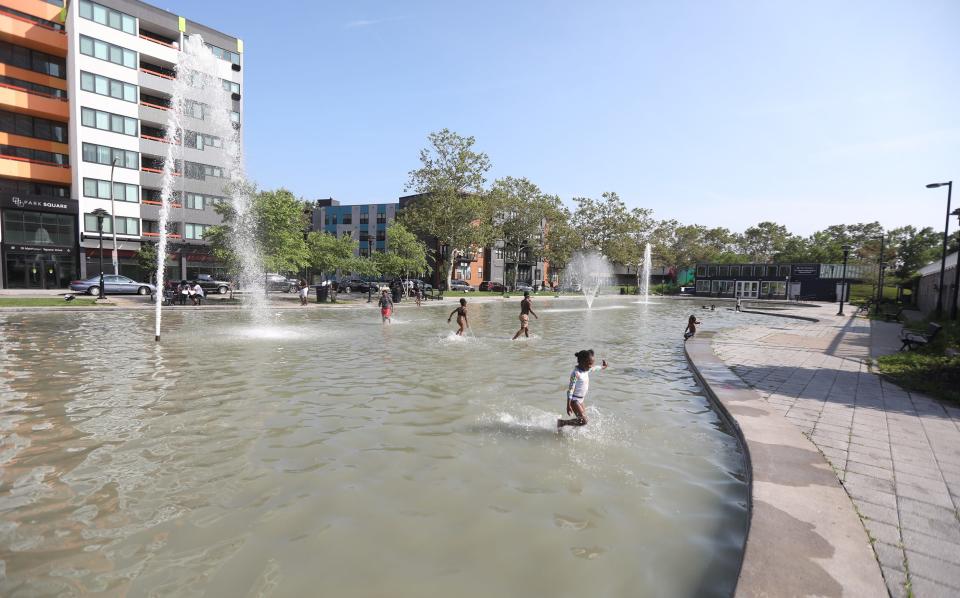
Brian Boose, teenager:
The pool used to be outside. It was the outside pool, but it being outside comes lack of security. So n----- wasn't even bothering me. I was cool with everybody, but it was the fact that I could be in the pool with a n---- that's not cool with everybody. And everybody that he not cool with is now outside the pool. So I'm in the pool and I ain't even know this n---- still in here. He pop up from out the water and I'm like, oh hell nah. Let get up out of here. I'm not finna keep doing that. Every time somebody with a target on their back show up, you know what I mean? I'm chilling at the rec. I tell everybody I'm about to be at the rec all day, pull up. And then some dude I don't like show up that I know got to target on his back. If he stay here direct getting shot up, I'll be like, mm, alright, time to leave.
I got to leave every time. Some n---- I know fixing to cause a problem without even doing something like show up. Nah.
Rob Bell, USA TODAY Network reporter:
Officer Moses Robinson was a school resource officer at Rochester's East High School for 18 years.
Moses Robinson, Rochester Police Department:
During the time of summertimes that most of my children, my kids have been killed. I've had 17 of my kids murdered at East High School when I was there. And they weren't dying from car accidents or illnesses or things of that nature, which is health-related. They were gun-related. I took a kid to a funeral for an Asian kid who was killed in an act of violence and the kid that I took to the funeral, a year later he got killed. When the weather gets warm, that's when people come out. And when people come out, sometimes it is just this chance encounter.
Brian Boose, teenager:
I just had a balloon release. They shot that up. It's a hundred people gathered up there out of everybody at a balloon release. You don't know who was there. You don't know who they was shooting or not.
Moses Robinson, Rochester Police Department:
Some of these guys are very hypersensitive. They've been hurt, they've been traumatized, they've been beaten, they've been abused. A lot of these guys. So they've made an oath and a promise to themselves. They'll never get caught slipping. They'll never get hurt again. And so they carry weapons as a form of protection against being hurt again. And then unfortunately there's been a vendetta.
So that combination of trauma not being heard and then the chance encounter between that person and maybe some misunderstanding if had in the past that wasn't resolved. And then words are exchanged. I think that fire happens.
Recorded police dispatcher call, Rochester:
(radio chatter) ... getting response from EMS … North Union Street, shooting, male laying down in the front yard. ... Recovered handgun. Looks the caller was hit in the head by their ex-boyfriend. They're still waiting at the location. (inaudible) menacing with a knife...
Moses Robinson, Rochester Police Department:
The calls for services go up and when the calls for services go up, the stress goes with it. So I can't give you, if I'm an officer responding to a call, I'm not going to be able to clearly give you the service, the quality of service that you may want. I'm being dinging for another call or I may have to back up another officer going for another call. You call me because you have a need, you have a need, you in a crisis moment. You need me there. And so it's not quite fair to you as a citizen that as I'm trying to deal with your situation, I'm listening in my mind to what's going on on the radio and then I'm trying to be in like, quote, "two places at one time."
There's a thing called vicarious trauma and I think that vicariously a lot of officers, including myself, we push things down. And so when these violence incidents erupt during the summertime, oftentimes you got people who come out who look, may have witnessed, may be a family member, and this person's deceased, and is laying there in the middle of the road. And so you're looking at their family members going through the worst time in their absolute lives. It seems to really resonate deeply when it's like summer.
Rob Bell, USA TODAY Network reporter:
Before Anthony Hall made a career in violence prevention. He was caught up in the street life himself. Growing up in the third poorest ZIP code in New York state.
Anthony Hall, violence intervention specialist:
One of the most concentrated areas of poverty, (ZIP code) 14605, Clinton Avenue. Being in that environment and succumbing to some of the elements that derail you. Prison life, the gang life drugs that appeals to you when you don't have necessary things around you. And I'm not going to say that my households all bumped up because it wasn't, you know what I mean? But it wasn't perfect, but it wasn't all bumped up like a lot of our children we see today. But poverty played a huge role in behavior issues.
Cam Mixson, teenager:
How a lot of young n----- get in the streets now because the fact some of them don't have nothing. No one like being broke. Their mom Section 8, not kicking in their food stamps, not kicking in. So they like, man, f--- it. So they get up off their a---, make money for theyself.
Brian Boose, teenager:
So soon as it started getting hot, you see we had that one hot week, everything happened. It was just a chaotic week. That was the warmest week. We had consistently, you see how that's the hottest week we had consistently for the whole last two months. That's also the most active, shootings, active in all of that. The hottest days were everybody outside, gathered up.
Rob Bell, USA TODAY Network reporter:
On July 4th after the fireworks ended, seven people were shot in under two hours overnight in Rochester.
On a warm summer day, you'll likely find Hannah Gilmore, 74, with other seniors at Montgomery Neighborhood Center on Cady Street. She hates the heat.
Hannah Gilmore, senior citizen:
It makes you feel kind of drowsy and tired. They often say seniors should stay, drink lots of water because once you get dehydrated, you get (some) delusion. Your mind just don't act right.
Rob Bell, USA TODAY Network reporter:
Gilmore notices the boost of violence when it gets hot.
Hannah Gilmore, senior citizen:
I think it because it's warm and they can get out and cut up. A lot of people when it's cold, they don't kind of be trying to get out like they do in the summer. But in the summer, they just kill in the broad daylight.
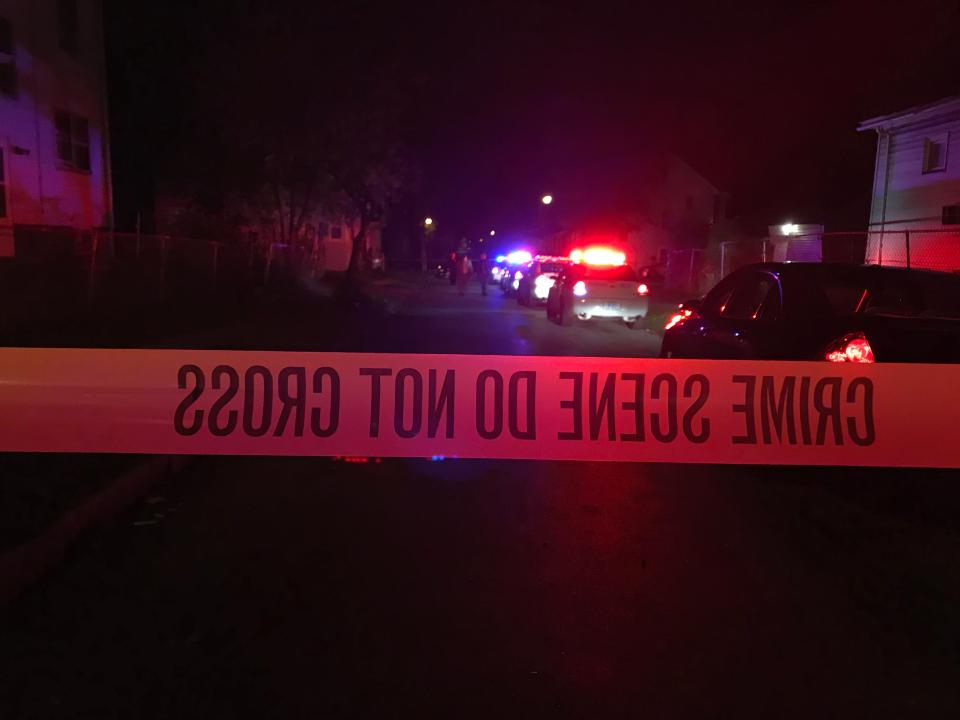
Rob Bell, USA TODAY Network reporter:
Twenty years ago, Hannah's son, 16-year-old Gabriel Gilmore, attempted to rob 18-year-old Tyree Clancy of marijuana on Jefferson Avenue in southwest Rochester. When Clancy pulled out a pistol and leveled it, Gilmore shot him three times with a .38-caliber revolver. According to court documents, Gilmore told investigators he didn't mean for anyone to get hurt; he was just trying to rob him.
Hannah Gilmore, senior citizen:
Well, I didn't know nothing about it until someone gave me a call and told me that was my son did it. I didn't know. But he wasn't raised that way. … Older guys, they have a tendency to mislead younger guys, like the little baby boys like 15 and they got a 25-year-old, they following. So I don't even know where he did get a gun to put it in his hand cause I didn't have a gun.
Rob Bell, USA TODAY Network reporter:
After jurors rejected a self-defense claim, Gabriel Gilmore was convicted of two counts of second-degree murder. He was sentenced to 20 years to life.
Hannah Gilmore, senior citizen:
He comes home in June next year.
Rob Bell, USA TODAY Network reporter:
You all still have a good relationship?
Hannah Gilmore, senior citizen:
Yes. I went up to see him three months ago.
Rob Bell, USA TODAY Network reporter:
OK, how was that?
Hannah Gilmore, senior citizen:
It was good. I looked at him. He looked the same. He don't look at his age. He looked tall well, way over me and had his glasses on and he looked just like ... looked like to me — you shouldn't be here. You should be a college student or something. The way he looked. Yeah, when I looked at him, I said, "Oh, God."
Brian Boose, teenager:
I can't really fault all the parents. You see what I'm saying? Because then there's that conflict between taking care of your kid, regardless of how they're acting and making, disciplining your kid. If they're not listening, all right, maybe it's time to cut the leash. They want to be this street kid and go out there and do whatever. But that's the problem. Nobody really want to let their kid go at 14, 13, 12. You shouldn't have to. Especially because they're affiliated with something that they don't really know about.
Hannah Gilmore, senior citizen:
Well, the thing is, I put him in God's hands when it first happened and I left him there. So that made it easy for me because God going to protect him. I can't. I know he's around real demons now. He just moved from Attica to a smaller facility now because he on his way out. But a lot of people don't know that's where the demons at — in prison.
You think you fight out here. He fights in there.
Rob Bell, USA TODAY Network reporter:
Tyree Clancy was Rochester's seventh homicide in 2003.
When his obituary was published in the newspaper, the photo was of Clancy as a small child.
Anthony Hall, violence intervention specialist:
I know because of who I am, our souls are redeemable and that is something that has to be innate through all of us. You just can't think that we going to throw this person away. They did something, but they're redeemable. And that's not saying that folks shouldn't be incarcerated for some of the behaviors and their actions.
That's not saying that consequences shouldn't happen, but it is saying that folks do deserve a second shot.
The Democrat & Chronicle has been investigating the effects of a rapidly heating planet on people who live in our city. Follow along with "City on Fire" as we report the struggle with summer temperatures caused by climate crisis. This is part of the USA TODAY project Perilous Course. Contact D&C journalist Rob Bell at rlbell@gannett.com to be included in a story if you have been affected by climate crisis or heat or William Ramsey for general climate impact.
EDITOR'S NOTE: The first version of this story claimed that Rochester had experienced the hottest year on record. That was the case by one measure analyzed by Southeast Regional Climate Center for an East Coast data project using NOAA information when we pulled Rochester weather station data in July. The driver of the "hottest year" average was mostly pushed up by a warmer winter start to 2023. It has not been "the hottest year" for Rochester by mean temperature through June, as measured by the National Weather Service-Buffalo. A meteorologist there crunched numbers for us Sept. 7 and said it is hard to say what the hottest year was through the period he was most comfortable analyzing at this point in the calendar: Jan. 1-June 30. The year 2023 by mean temperature has been 1.5 degrees above normal through the first 6 months of the year. But he found that 2016 in the same period was 1.8 degrees above normal. In any case, it has not been the hottest summer. Thank you to a sharp-eyed reader who questioned our research. We welcome that! More, please. We aim to answer your questions about weather and climate crisis in Upstate New York and hope you will challenge us with science and facts and puzzling things you wonder. And please point out when you see something that doesn't track. Feel free to contact one of our newsroom editors, especially wramseyiii@gannett.com.
This article originally appeared on Rochester Democrat and Chronicle: Rochester crime, gun violence rise in summer heat: D&C investigates

